

Web excerpts. Q&A. Others. Painless Panels. How Not to Suck Being a Conference Moderator or Speaker. A fine looking audience at PRSA International 2010.
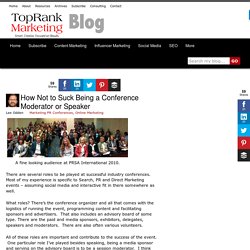
There are several roles to be played at successful industry conferences. Most of my experience is specific to Search, PR and Direct Marketing events – assuming social media and interactive fit in there somewhere as well. What roles? There’s the conference organizer and all that comes with the logistics of running the event, programming content and facilitating sponsors and advertisers. That also includes an advisory board of some type. All of these roles are important and contribute to the success of the event. What is a moderator supposed to do? My experience is that the moderator is asked to perform their role after the session topic and speakers have been selected. Can moderators make more than the minimum effort? Moderators shouldn’t steal from speakers.
Moderators should set the stage. As the speakers need to be regulated on time, so do audience members asking questions. 10 Do's and Don'ts for Moderating a Panel Discussion. As an entrepreneur, part of any solid marketing and public relations plan will likely involve you (or key spokespeople from your company) hitting what I like to call the “speaker-panelist-moderator” circuit.
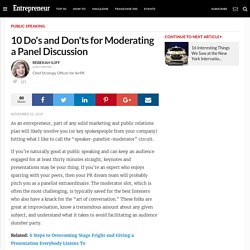
If you’re naturally good at public speaking and can keep an audience engaged for at least thirty minutes straight, keynotes and presentations may be your thing. If you’re an expert who enjoys sparring with your peers, then your PR dream team will probably pitch you as a panelist extraordinaire. The moderator slot, which is often the most challenging, is typically saved for the best listeners who also have a knack for the “art of conversation.”
These folks are great at improvisation, know a tremendous amount about any given subject, and understand what it takes to avoid facilitating an audience slumber party. Guy Kawasaki - How To Be a Great Moderator. How many times have you watched a panel and thought that it was entertaining and informative?

Your answer is probably a small number. Moderating a panel is deceptively hard–harder, in fact, than keynoting because the quality of the panelists is usually beyond your control. Moderating a Panel: 8 Ways to Run an Excellent Discussion. You’ve just been asked to moderate a panel next week — yikes!
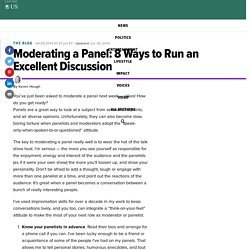
How do you get ready? Panels are a great way to look at a subject from several viewpoints, and air diverse opinions. Unfortunately, they can also become slow, boring torture when panelists and moderators adopt the “speak-only-when-spoken-to-or-questioned” attitude. Moderating a Panel. How to Moderate a Panel Properly - Eventbrite UK Blog. I’ve participated in plenty of panels – both as a panelist and moderator – and have seen the good, the bad and the ugly of panel discussions.
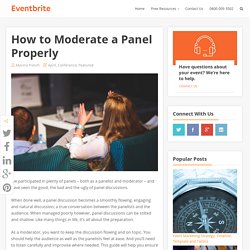
When done well, a panel discussion becomes a smoothly flowing, engaging and natural discussion; a true conversation between the panelists and the audience. When managed poorly however, panel discussions can be stilted and shallow. Like many things in life, it’s all about the preparation. TIPS Facilitating Panel Discussions. How to Successfully Moderate a Conference Panel, A Comprehensive Guide. This post has now become recommended reading for moderators at Ad:Tech 2008, SXSW 2011 (see FAQ #10), and previous Web 2.0 Expo events.
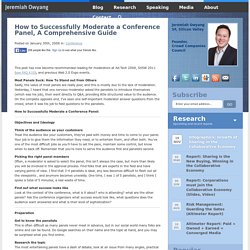
Most Panels Suck: How To Stand out from Others Sadly, the value of most panels are really poor, and this is mostly due to the lack of moderation. Yesterday, I heard that one nervous moderator asked the panelists to introduce themselves (which was his job), then went directly to Q&A, providing little structured value to the audience. On the complete opposite end, I’ve seen one self-important moderator answer questions from the crowd, when it was his job to field questions to the panelists. Panels, in moderation - Confessions of an Idiosyncratic Mind. Relax.
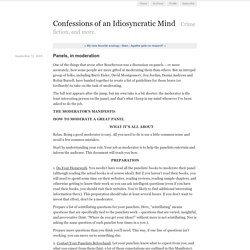
Being a good moderator is easy. All you need to do is use a little common sense and avoid a few common mistakes. Start by understanding your role.Your job as moderator is to help the panelists entertain and inform the audience. This document will teach you how. Scott Kirsner: Events / Guidelines for Great Panels. 13 Guidelines for Great Panel Discussions Advice for Event Organizers and Moderators ome panels crackle with energy, elicit fresh ideas, and bring the audience into the discussion.
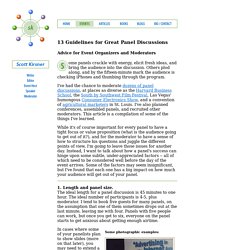
Others plod along, and by the fifteen-minute mark the audience is checking iPhones and thumbing through the program. I've had the chance to moderate dozens of panel discussions, at places as diverse as the Harvard Business School, the South by Southwest Film Festival, Las Vegas' humongous Consumer Electronics Show, and a convention of agricultural marketers in St. How To Moderate a Panel Like a Pro. The panel discussion was invented by someone who liked to sit three feet above his audience, talk with five of his closest friends for an hour, and barely acknowledge that there are 100 other people in the room, usually sitting in uncomfortable chairs.

But until the panel discussion disappears from the agendas of conferences and networking events, you may be asked to moderate one. Lucky for you, the bar is very, very low. How to Effectively Moderate A Panel - Patricia Fripp. Patricia Fripp, CSP, CPAE, asks Rebecca L.
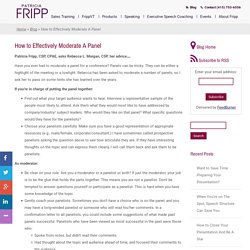
Morgan, CSP, her advice… Have you ever had to moderate a panel for a conference? Panels can be tricky. They can be either a highlight of the meeting or a lowlight. Rebecca has been asked to moderate a number of panels, so I ask her to pass on some hints she has learned over the years. If you’re in charge of putting the panel together: Find out what your target audience wants to hear. As moderator: Be clear on your role. General hints: Control the physical set up. Imagine a training program that gives you 24/7 access to one of the most in-demand executive speech coaches and sales presentation experts. Insight phases. Copy of TASK list.2017.v2.